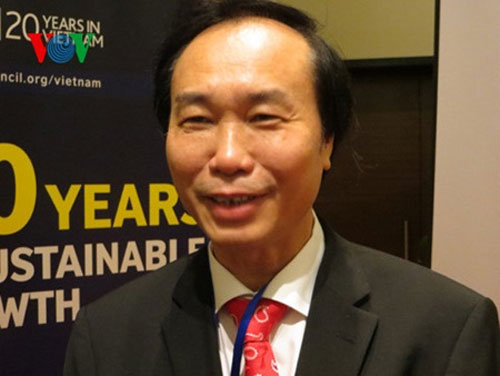|
Local labourers may lose out at home after regional integration
Director of the General Department of Vocational Training, Duong Duc
Lan, spoke to the Voice of Viet Nam (VOV) about the free flow of labour after
Viet Nam officially joined the ASEAN Economic Community.
Could you please detail opportunities, as well as challenges, facing
Vietnamese labourers after the country became part of the AEC?
The AEC will not only offer better job opportunities for labourers in
their own country, but in many other countries. At this point, there is only
one labour market, and labourers have the opportunity to find jobs in all 10
member states of the ASEAN bloc.
Nevertheless, if labourers fail to meet necessary job requirements in
these countries, it will be hard for them to get a job. In addition, if
labourers' skills are not recognised in countries in which they seek jobs,
they will be paid as low as unskilled labourers, thus, they will be put at a
disadvantage.
We are expected to generate a skilled labour force that will be able
to find jobs, not only in Viet Nam, but in many other countries, such as
Singapore, Malaysia, Indonesia and Thailand. These states are badly in need
of skilled labourers in certain sectors.
AEC will pave the way for skilled labourers from other countries to
come to work in Viet Nam. Many are worried that if Vietnamese labourers are
not well prepared, they can lose jobs at home. What do you think about this
concern?
This is really a challenge. If Viet Nam can't provide the labour force
required for such positions, it needs to hire foreign labourers. It will be
easy now for labourers from the 10 ASEAN countries to move to Viet Nam to
work.
Therefore, Viet Nam needs to be pre-emptive and act on its own
initiative. For years, many enterprises had to hire foreign specialists, but
in recent years Vietnamese labourers have been able to replace positions
filled by the foreign labour force, even in complicated technical posts.
With what we have been doing, and under the circumstance of ASEAN, I'm
convinced that we should not be too worried. In reality, enterprises asserted
that Vietnamese labourers could fill positions that require high techniques and
high quality. What Vietnamese labourers lack are soft skills, such as the
ability to work within a group to meet occupational disciplines, and foreign
language competence, among others, to which we will also pay special
attention.
How has Viet Nam prepared itself to train its labour force to become
integrated?
Since 2011, the Party and State have continuously issued guidelines in
order to strengthen the quality of human resource training, as well as to
create breakthroughs in the quality of vocational training. Specifically,
Viet Nam has made public the Vocational Training Strategy for the 2011-20
period, and Viet Nam Human Resource Development Planning for the 2011-20
period.
Additionally, the Prime Minister promulgated Decision 371 [dated
February 28, 2013], allowing the transfer of foreign training programmes, as
well as teacher's training programmes in Viet Nam. The Prime Minister's
Decision 761 [dated May 23, 2014] gives the green light for the selection of
certain vocational schools to receive further investment to become
high-quality vocational institutes. It can be said that this period of time
has seen a great number of significant documents issued by the Party and
State to reinforce the quality of the general human resources and that of
vocational training, in particular.
In vocational training, we have attempted to make breakthroughs in the
quality of vocational training. We have singled out 120 professions, among
those currently instructed at 500 vocational schools nation-wide, for
intensive investment, of which 34 professions will receive additional funding
to reach standards set by developed countries, through the
transfer/application of foreign advanced training programmes.
At present, we have transferred the training syllabus of 12
professions from Australia. Australian partners are checking teaching and
providing material facilities, as well as lecturers' qualifications, to begin
pilot training courses. If successful, there will be about 1,200 Vietnamese
graduates of higher vocational training by 2018, earning two degrees at the
same time, one Vietnamese and one Australian.
In the coming time, we will transfer training programmes of 14
professions from Germany, a prestigious vocational training hub in the world.
These efforts aim to apply advanced curricula for 34 professions by 2020 in
certain vocational schools, enabling trainees to earn one Vietnamese degree
and one degree from a developed country. The second degree will be recognised
in all ASEAN member countries, as well as in many other countries in the
world.
This will be a good opportunity for us to prepare ourselves for the
AEC and the Trans-Pacific Partnership. Within these playing fields, we will
make all-out efforts to match member countries and to take full advantage of
opportunities in integration and competition.
VNS
|
Thứ Bảy, 9 tháng 1, 2016
Đăng ký:
Đăng Nhận xét (Atom)

Không có nhận xét nào:
Đăng nhận xét